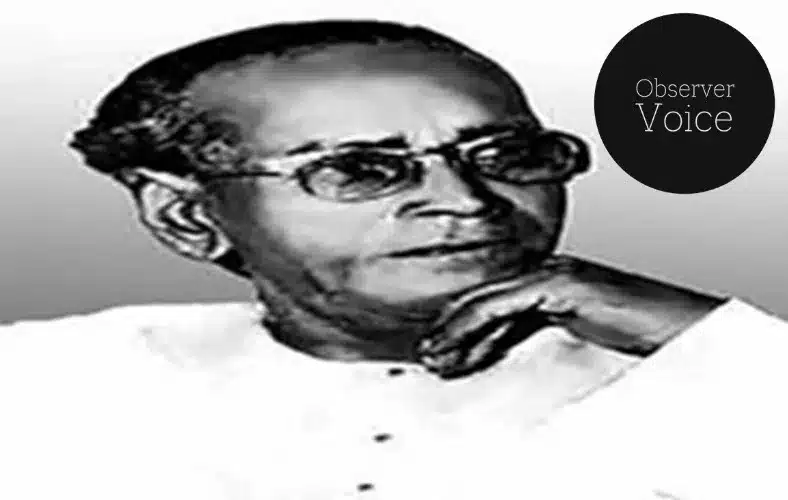Tarasankar Bandyopadhyay: Weaving Tales of Bengal’s Rich Cultural Tapestry

Tarasankar Bandyopadhyay (23 July 1898 – 14 September 1971) was an Indian novelist. He wrote 65 novels, 53 storybooks, 12 plays, 4 essay books, 4 autobiographies and 2 travel stories.
Life and Career
Tarasankar Bandyopadhyay was born on 23 July 1898, in West Bengal, India. In 1916, he passed his Matriculation exam from Labhpur Jadablal High School and went to St. Xavier’s College, Calcutta and then to South Suburban College (now Asutosh College). He joined the non-cooperation movement while he was in intermediate at St. Xavier’s College. Because of ill health and political activism, he couldn’t finish his university course. He was also associated with a radical militant youth group during these college years, and he was arrested and interned.
As a member of the Indian independence movement, he was arrested in 1930 but was later released. After that, he went into literature. Rabindranath Tagore met him for the first time in 1932 at Santiniketan. The same year he published his first novel Chaitali Ghurni.
He moved to Calcutta in 1940 and later moved to Baranagar in 1941. He was the president of the Anti-Fascist Writers and Artists Association in Bengal in 1942. In 1944, he presided over the Kanpur Bengali Literature Conference organized by non-resident Bengalis. He also presided silver jubilee session Prabasi Banga Sahitya Sammelan Mumbai which was inaugurated in 1947. He also got the Sarat Memorial Medal at Calcutta University.
Among his works were Ganadevata, Jaalsaghar, Abhijan, Raj Kamal, Bicharak, Kavir, chandranath, etc. ‘Ganna Begum’ is a historical novel worth mentioning for its traditional values. In 1967, Tarashankar Bandopadhyay won the Jnanpith Award for his novel ‘Ganadevata,‘ about a schoolmaster fighting tyrannies in his village. “Jalsaghar” examines the natural decay of feudalism and the values surrounding a Zamindari family who has fallen on hard times, immortalized by Satyajit Ray. Abhijan, a story about a cab driver in a hypocritical society, would be his masterpiece. In ‘Bicharak‘, a judge struggles to reach a decision about a murder case, and in ‘Kavi,‘ a gypsy poet wanders around with prostitutes and dancers. He also led the Indian delegation to the Asian Writers’ Conference in Tashkent in 1957. He was elected president of Bangiya Sahitya Parishad in 1970. From 1952-60, he was a member of the West Bengal Vidhan Parishad and from 1960-66, he was a member of the Rajya Sabha.
He died on 14 September 1971, in West Bengal, India.
Award and Legacy
In 1955, he won the Rabindra Puraskar for his novel Arogya Niketan, and in 1956 he won the Sahitya Akademi Award. He won the Jnanpith Award for Ganadebata in 1966. He was also awarded with the Padma Shri in 1962 and the Padma Bhushan in 1969.
Observer Voice is the one stop site for National, International news, Sports, Editor’s Choice, Art/culture contents, Quotes and much more. We also cover historical contents. Historical contents includes World History, Indian History, and what happened today. The website also covers Entertainment across the India and World.

